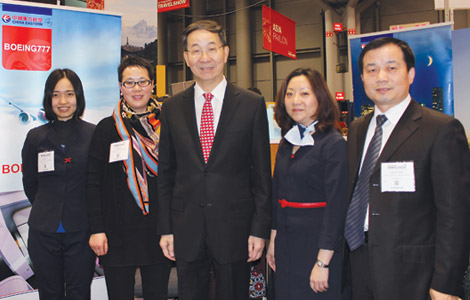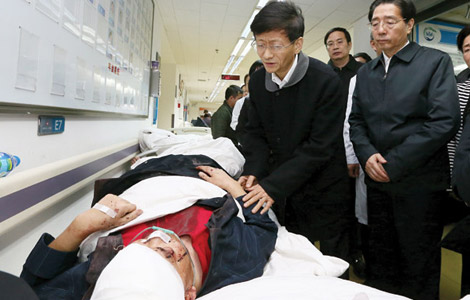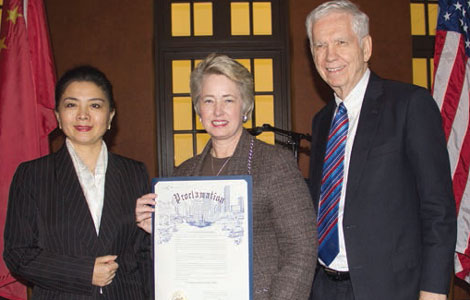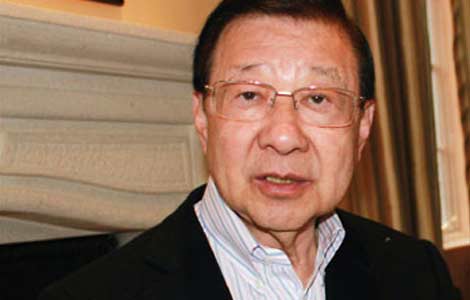Deputies persevere on winding road to change
Updated: 2014-03-04 08:37
By He Na and Peng Yining (China Daily)
|
||||||||

Turning two sessions proposals into reality can be a long but rewarding process, report He Na and Peng Yining in Beijing.
For four years, He Youlin, an educator and deputy to the National People's Congress, repeatedly proposed the relaxation of China's family planning policy.
Although the proposal was rejected on several occasions, he continued to raise the issue and eventually achieved his goal.
"I just did what an NPC deputy should do, but I received more support and trust than I ever expected," he said.
As the two sessions, the annual meetings of the NPC and the National Committee of the Chinese People's Political Consultative Conference, open this week, such proposals have come under the spotlight once again.
Reform of various aspects of national policy, including family planning, re-education through labor, and medical security, was originally proposed by members of China's largest decision-making bodies.
During the past decade, suggestions and recommendations from deputies have become the driving force behind China's political and economic change.
He, principal of Sun Yat-sen Memorial Middle School in Zhongshan, Guangdong province, said turning a proposal into reality isn't an easy or straightforward task.
For the first two years of the campaign, his was a lone voice among the deputies.
His proposal failed to attract the attention of government departments, and he didn't receive a reply. At one point, he was approached with a suggestion that he should shelve his proposal to save time for more worthwhile endeavors.
"Of course, I didn't give up because I knew my proposal was based on facts. I learned about the struggles people faced and the real problems caused by the strict family planning policy during the past three decades. Also, the people I had interviewed were waiting for good news," He said. "The situation improved in the following two years when the National Health and Family Planning Commission dispatched staff to meet me and explain its point of view."
He's tireless efforts and perseverance, in tandem with a small number of NPC deputies and members of the CPPCC, paid off. In November, the CPC leadership decided to relax the family planning policy nationwide. The reform stated that if one member of a couple is an only child, they will be allowed to have a second child.
"I consider the committee's change of attitude to be a huge step forward. I'll continue to hand in family planning-related proposals this year, because although the policy has been relaxed, in my opinion the moves don't go far enough. I will call for all limits on the size of families to be the removed to help relieve the rising problem of labor shortages," He said.
The family planning proposal isn't his only success. Some of his other proposals have also been adopted, such as greater financial input in elementary education.
"I am a deputy from the grassroots, so what I say during the two sessions should represent the people, so their voices can be heard. The road to seeing a printed proposal become a reality is a bumpy one, but I will continue to travel it. It's rewarding to see people's lives improving and to know that I have played a part in that improvement," he said.
Social progress
Xie Chuntao, a professor at the Party School of the CPC Central Committee, said the motions proposed by NPC deputies and CPPCC members have an obvious effect on the development of social progress and improvements in people's welfare.

 China joins in NY Times' travel show
China joins in NY Times' travel show
 UN envoy condemns terrorism
UN envoy condemns terrorism
 Rio drops protests for Carnival
Rio drops protests for Carnival
 Houston-China bonds deepen with new group
Houston-China bonds deepen with new group
 Citizens mourn victims of Kunming terror attack
Citizens mourn victims of Kunming terror attack
 Putin justifies potential military move in Ukraine
Putin justifies potential military move in Ukraine
 Photos: Kunming rail station violence
Photos: Kunming rail station violence
 Successful businessman gives back to the community
Successful businessman gives back to the community
Most Viewed
Editor's Picks

|

|

|

|

|

|
Today's Top News
US First Lady to visit China in late March: White House
Terrorist group in Kunming attack busted
2014 the year of the Chinese IPO?
China making progress on fighting pollution: experts
Michigan benefits from long-sighted ties building with Chinese
Detroit toasts all time high in China trade
China to severely punish terrorist attackers
Ukraine mobilizes after Putin's move
US Weekly

|

|







